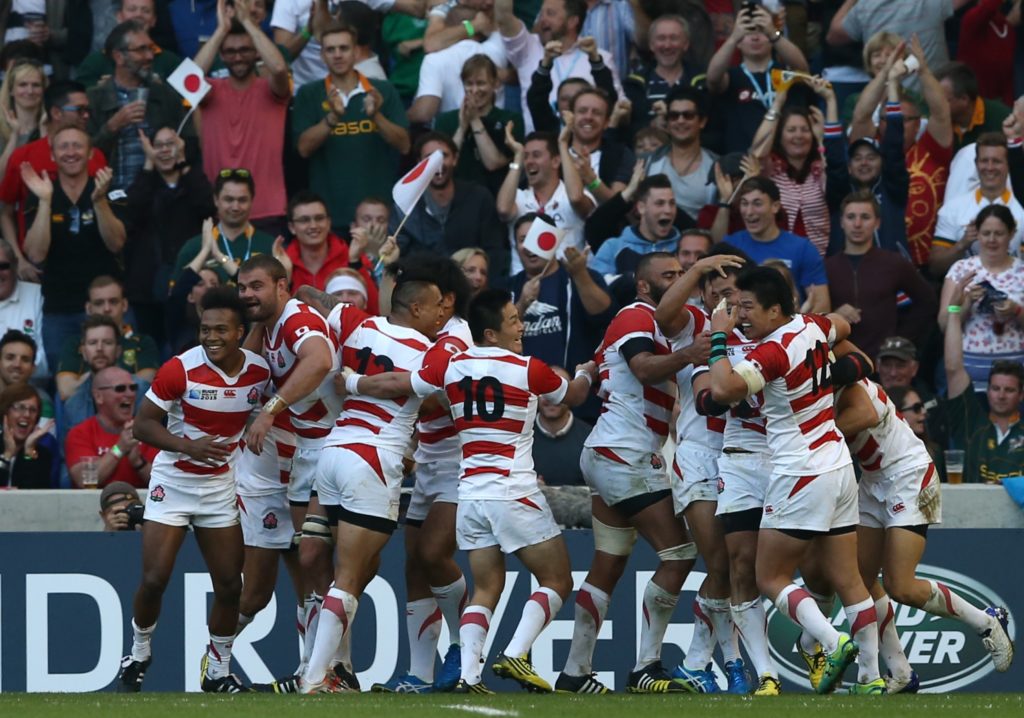JON CARDINELLI looks back at Japan’s famous win over the Springboks on the opening weekend of the 2015 World Cup.
‘Surely this can’t happen,’ a colleague of mine said as we stood to stretch our legs at half time. ‘Surely the Springboks can’t lose to Japan.’
The media area at the Amex Stadium in Brighton is directly above the tunnel on the halfway line. As we stood, we got a glimpse of the players as they headed toward the change rooms.
Most of the non-playing Springbok reserves wore expressions of disbelief. Duane Vermeulen gave a disgusted shake of the head as he joined the group in the tunnel.
The rest of the stadium heaved with excitement. The Japanese fans seated above us started to sing. After 40 minutes, the performance by the Brave Blossoms was certainly worth celebrating.
As the Boks hit back in the second half, the South African journalists started to type up their match reports. The Japanese players were spent and the game appeared to be on track for a predictable outcome.
Or so we thought.
The Japanese fans continued to celebrate as the final quarter approached. When the momentum on the field shifted, however, so too did the mood in the stands.
I closed my laptop and decided to wait to see how it all ended. A British journalist, who hadn’t intended to work that day and had only come to watch because he lived nearby in Hove, opened his.
Everybody at the ground could feel it. Something big was about to happen.
It felt as if 100,000 people rather than 30,000 were packed into the modest-sized stadium. It felt like the ground was shaking.
Behind me, however, it had grown quiet.
ALSO READ: Saitama selections highlight Bok mindset
I turned around to check on the Japanese contingent that had been so vocal in the preceding 60-odd minutes. Their mouths were hanging open. Their arms were pumping back and forth as if they were attempting to push their heroes over the tryline.
Perhaps they had come with no expectations. Perhaps they had decided that – no matter the scoreline – they would celebrate the fact that the less-fancied rugby nation of Japan was competing in a World Cup clash with one of the traditional heavyweights.
Now that Japan were in sight of a win, there was something else in their manner. Their eyes shone with belief.
The big screen showed Eddie Jones in the dying moments. I remember seeing the same look on his face.
Afterwards, Jones confirmed that the players had overruled his instruction to kick for goal and secure the draw. Captain Michael Leitch and the leaders felt that Japan were within touching distance of one of the greatest upsets in sporting history.
Like the rest of us in the cauldron, Jones was forced to watch the final moments play out.
ALSO READ: ‘Boks will take Japan seriously’
As I sat in the eye of the hurricane at the Amex Stadium, I was forced to revise my understanding about the limitations of sporting theatre.
Most of the people in the crowd – whether they were locals or South Africans clad in Springbok jerseys – joined the Japanese fans in cheering the Brave Blossoms on. When Karne Hesketh powered over in the left-hand corner, the stadium exploded.
The Japanese media welcomed Jones and Leitch to the post-match conference with a round of applause. From there, Jones – aware of the magnitude of the achievement – playfully suggested that he could retire to the Caribbean knowing he had done something special during his tenure as a rugby coach.
By contrast, the volume dial was turned right down for the South African conference.
Coach Heyneke Meyer and captain Jean de Villiers shuffled into the media room with their shoulders hunched and their heads bowed. Their voices were barely audible. It was as if they had been punched in the gut before entering the room.
Even now, some four years later, the coaches and players who were involved in that match bear significant mental scars. They have no reason to underestimate an opponent ever again.
A few days after that result in Brighton, I caught up with Meyer and asked if he had any objective thoughts about the game and what it meant for the sport as a whole. The likes of JK Rowling had gone as far to describe it as an incredible story that could not be scripted.
‘It’s great for the game,’ Meyer said. ‘It’s great to see a side like Japan getting a result like that.’
He then shook his head and adopted a less diplomatic tone.
‘It’s just unfortunate that they had to go and do it against us.’
Photo: JUSTIN TALLIS/AFP/Getty Images)





